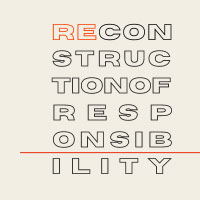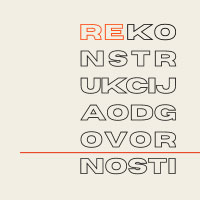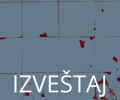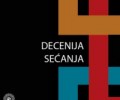Report from the Debate: “ReConstruction of Responsibility – Societal Memory of Genocide”
 On the occasion of marking the 29 years since the Srebrenica genocide, the Humanitarian Law Center organised a public debate on July 10, 2024, titled “ReConstruction of Responsibility – Social Memory of Genocide”. The aim of the debate was to stimulate critical reflection on the political discourse constructed around the genocide, in which the nation becomes a defensive mechanism that avoids and prevents discussion about responsibility.
On the occasion of marking the 29 years since the Srebrenica genocide, the Humanitarian Law Center organised a public debate on July 10, 2024, titled “ReConstruction of Responsibility – Social Memory of Genocide”. The aim of the debate was to stimulate critical reflection on the political discourse constructed around the genocide, in which the nation becomes a defensive mechanism that avoids and prevents discussion about responsibility.
The debate featured presentations by Marija Mandić, a linguist and senior research associate at the Institute for Philosophy and Social Theory; Milan St. Protić, a historian and diplomat; and Srđan Milošević, a lawyer and historian. They spoke about how we talk about Srebrenica today, the relationship between responsibility and guilt, and the role of the nation in the official narrative.
Jovana Kolarić, coordinator and researcher at HLC, moderated the debate, and opened it by presenting court-established facts about the legal qualification of the Srebrenica genocide through final judgments of international courts. She mentioned that the Office of War Crimes Prosecutor, in its 20 years of existence, has filed only five indictments for crimes committed in July 1995 related to Srebrenica. None of these indictments mention genocide, and in three of them, Srebrenica is not mentioned at all. However, although these facts are rarely discussed in Serbia except when they are denied, Srebrenica is still talked about.
On the question of how we actually talk about Srebrenica, Marija Mandić proposed that instead of focusing on facts, we should first talk about the constructed narratives within which these facts are interpreted. She stated that narratives always differ when talking about Srebrenica in Europe, Serbia, or Bosnia and Herzegovina, as well as whether they are individual or collective. The use of the phrase “genocidal nation” during the campaign against the adoption of the UN resolution on Srebrenica was a strategically insidious move by the ruling elite, which accomplished its intended role among that part of the population it was targeted at. This phrase is not used anywhere outside Serbia, but is used only by government representatives and their supporters in the context of denying the Srebrenica genocide, as well as in Serbian historiography, where there are examples of labelling other nations as genocidal. Although this is an effective government strategy, the phrase is merely a slogan created to distract and obscure what is really happening. Mandić particularly emphasized that strong collective traumas are present in the former Yugoslavia, which are manipulated daily, and that each trauma needs to be acknowledged.
Discussing the consequences of the political instrumentalisation of the Srebrenica genocide, Milan St. Protić stressed that there has been a continuous denial of facts in Serbia from 1995 to the present, and that presenting the nation in its entirety as being held accountable internationally, is a systematic move that serves to justify the perpetrators of the crimes. He believes that after October 5, the crime should have been condemned, and the policy of Slobodan Milošević, which led to armed conflicts, should have been rejected; however, this did not happen, which indicates the political immaturity of the political elite and society. The disqualification of political opponents regarding the topic and issues of the Srebrenica genocide, and the portrayal of Serbia as the “eternally unloved nation” internationally, are aimed at establishing and maintaining absolute power. In this process, the population is made to feel it is surrounded by enemies, xenophobia and anti-European hysteria are incited, and a complex of inferiority and defeatism is constructed.
Srđan Milošević reminded those present that Serbia is obliged to respect the judgments of international courts, but that instead, a mechanism has been created in society where the authorities, especially the intellectual elite, serve as a “denial service.” Efforts are made to deny the genocidal nature of the events in Srebrenica, while in institutions, schools, and cultural establishments, nothing has been done officially to help remove the stigma caused by these crimes. Competent debates on the concept and definition of genocide are not conducted; instead, everything has been reduced to manipulation, leading to popular identification with war criminals. Milošević believes that the sporadic gestures acknowledging the crimes and paying tribute to the victims which we have witnessed in recent years have been drowned in denial and belittlement, rendering them meaningless today. In Serbia, the need for (self-)victimization has reached almost pathological proportions, portraying Serbs as the only and exclusive victims.
Historian Olga Manojlović Pintar joined the debate to present the main findings of her work titled “The Use of History, Crime Denial, and the Concept of Impunity in the Republic of Srpska (1992–2022).”
During the discussion, the use of public resources in denying the Srebrenica genocide and other crimes was also addressed. Such massive use of public resources is a powerful means of manipulation and creating false narratives that, skillfully constructed, can influence even well-meaning people. The issue of responsibility must be addressed by the political and social elites, but the conclusion is that it is difficult to expect Serbia to willingly choose to confront these issues without some external or internal pressure.
Public Debate: ReConstruction of Responsibility – Social Memory of Genocide
The video is in the Serbian language.








